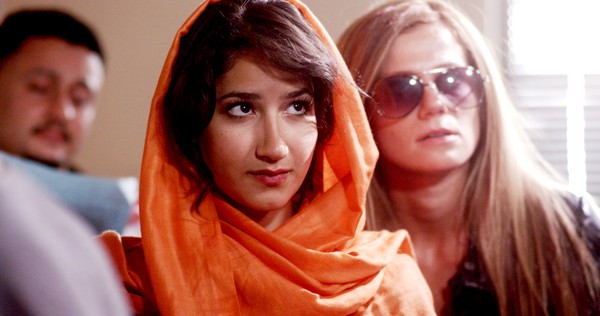In 2013, the Tribeca Film Festival Nora Ephron Prize was given to Meera Menon, the co-writer/director of Farah Goes Bang, an American comedy about three recent college graduates who join the John Kerry campaign in 2004. Starring Kandis Erickson, Kiran Deol, and Nikohl Boosheri as Farah, the movie is a coming-of-age, buddy comedy, road trip movie; three genres usually dominated by men.
Although it took two years of showing the film at festivals, where it received rave reviews and four more awards, the movie was finally released on iTunes Friday. Menon and her co-writer/producer Laura Goode were celebrating the release last week, and found time to speak about their new comedy, diversity in film, and making a period movie less than a decade after the events occurred.
Lesley Coffin (TMS): What was the time frame from when you started filming the movie to finally getting the filming into festivals?
Laura Goode: We conducted a Kickstarter campaign in April 2012 and then we shot right after, in the summer of 2012, and Meera edited like a mad woman for the festival deadline, and we premiered at Tribeca in April of 2013. So all said, the process was about a year of production and debuting it, and then it’s been two years of festivals and looking for distribution.
TMS: The film is set a little less than a decade earlier, and focuses on John Kerry’s candidacy. Was there a specific reason you wanted to set the film then and not try to modernize it and focus on President Obama’s candidacy?
Meera Menon: The simplest answer is that Laura and I were around the age of the girls at the time that Kerry was running, which was when we had our political awakening. I think that’s common for people in college, or just out of college as the girls in the film are, to have this sudden political awareness. But there was a movement for change in 2004 and feeling that the world was really changing. There was just so much dialogue that both excited and angered us, but just engaged us, which also has to do with the age we were, when your mind is open to change. So we were impacted personally by that election, so story wise, we thought it would be appropriate because of the coming of elements for our main character Farah, and we thought it would be appropriate to set that story against this moment when the country was going through its own moment of change.
TMS: Even though it’s less than a decade, what things did you had to take into account to set the movie then?
Goode: From a producing angle, it actually played out much more for me in terms of the physical and visual elements of the film than in the writing. For example, they all have cell phones, but in 2004 most people didn’t have iPhones. There is a scene where they’re at a gas station and we found a station that let us change their prices to reflect the prices in 2004, when it was $2 something a gallon. So that was the big challenge; to create a period piece from such recent memory, and select period-specific details that felt right but weren’t a distraction.

TMS: Did you write all three of the girls with their ethnicity in mind?
Menon: I think we rotated a couple of options when first writing. It was definitely important to present a portrait of diversity in their friendship, but also to provide complex, interesting roles for young women of color. It was always important that we have three girls. Very early we had a vision of a girl in a head scarf who was toying with perceptions of her own beauty and how her background played into that. But we were being somewhat elusive with that image, and played around with a couple of different scenarios. At one time, we played around with a backstory about Farah’s family life as a first generation Iranian. We thought her parents would have come here during the ’79 revolution and she had actually inherited her political engagement from her parents. But that backstory dropped off pretty quickly, but that was when we decided Farah should be Iranian. And then Roopa’s character we knew would be Indian to represent my background.
TMS: Did you speak about that earlier backstory that didn’t make it into the movie with Nikohl before filming?
Menon. We did, but we also spoke with Nikohl about her own family and backstory, and let her bringing a lot of herself to that role. That is part of the fun of casting, the collaboration between writer, director, and actress can completely change a character into something you never expected.
Goode: And I do think ethnicity was in our mind before we even started casting the film. It was important to us to have a Persian actress play a Persian character and have an Indian actress play an Indian character. We would have been more comfortable changing the character’s ethnicity than to cast someone to play a different ethnicity than their own. As a white writer, that harkens back to my discomfort with things like West Side Story, when Greek and Italian actors were cast as Puerto Ricans. The film industry has traditionally been very cavalier with this kind of casting and thought “as long as she’s not white, any kind of brown will do.” And we felt it was important to be more nuanced than that and allow their ethnicity to be a starting point for their characters and their relationships.
TMS: Was it difficult to make it clear to casting directors that they should consider specific ethnicities?
Menon and Goode: Yes!
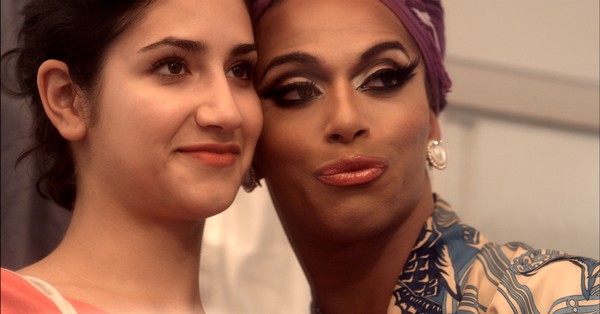
Goode: The way casting usually works is you’ll post a breakdown of what you are looking for, and their specifics, which includes their ethnicity. But what will usually happens is people will also be sent who don’t necessarily fit what you asked.
Menon: And what was unique to our casting process was that we did not approach casting agencies to suggest talent and held an open audition instead. A) because of the size and budget of our film; but B) because when you are specific about ethnicity, there aren’t many on those agency’s books that they can send. We were interested in finding talented people who didn’t have a team of people going to bat for them and pushing them forward. We wanted to find people who came to us and connected to the material.
Goode: It was a blessing in disguise being a micro budget film, because you want to pay people but because you can’t pay them as much as you want or as much as they deserve, you ultimately do know they are doing this because they connect to the story or the character. And that meant Meera and I knew we weren’t the only ones driven by passion for the project and we ultimately had a great group of collaborators behind us. No one was there just for a paycheck.
TMS: The movie is a road movie, which is a genre of its very own and ultimately, has been a traditionally male focused genre. Were there road movies from the past you wanted to reference or pay homage to?
Menon: We thought about a lot of them, and it’s true that there are not a lot of road movies about women. Our godmothers are Thelma and Louise, a fantastic movie, and Crossroads with Britney Spears, and that’s pretty much it! But in terms of the more recent male driven road movies, we’ve had things like Harold and Kumar and classics like Easy Rider. I love Alexander Payne’s movies like Sideways. Movies that draw upon the pantheon of American life. But when we were talking about female driven road movies, especially journey’s taken for the sake of having an adventure, there aren’t many. Thelma and Louise is a great movie, but what propels them onto the road is a sense of need and urgency, whereas our girls go on the road by choice; taking to the road for the sake of just wanting to find something new. We don’t see many stories of women making that choice.
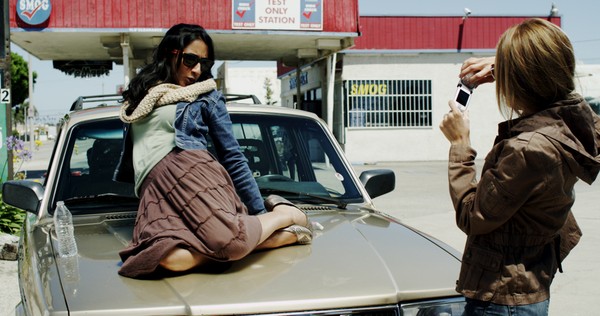
TMS: Why frame a story about Farah’s virginity around road trip and political storylines?
Menon: This is so fun to talk about. There is an idea throughout that Farah is trying to find her voice and agency, and that translates to all walks of life for her, so linking those three ideas together made sense for a story about her. And her sexuality is a lynch-pin for her in this story to her finding herself and where she belongs in the world.
Goode: I think John Kerry also plays a role in that part of the story. Meera and I conceptualized his role in the story, and while it is a comical idea to imagine John Kerry having sex, John Kerry does represent something in the virginity storyline. As little girls we’re all raised with this dream of Prince Charming, a guy who will just arrive and take away all your insecurities and doubts and problems. So the disappointment John Kerry and disappointments of your first sexual experience were prime for comic mining.
TMS: And one of the funniest scenes in the movie is when they are comparing John Kerry and John Edwards, who in 2004 we didn’t know about anything about his sex life.
Menon: I know, and he was kind of presented as this political babe in 2004. But in retrospect, it’s kinda funny.
TMS: Did either of you take road trips in college or just after college that you got to use as inspiration?
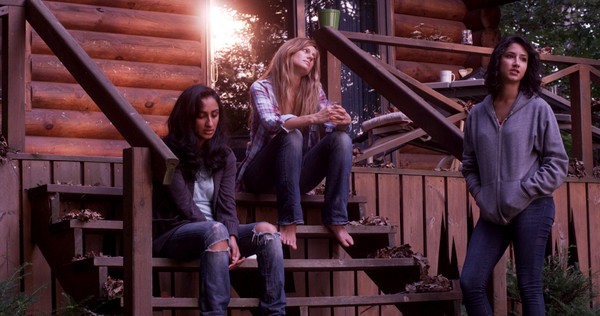
Goode: Yeah, I took a road trip in college with some of my male friends and one right after college with one of my girlfriends. Some of the stuff I remembered from those trips were definitely used in the film, like Diet Coke cans that you would always kick out of the car when getting out. Just the details of living in a car for days and days and weeks and weeks.
TMS: When the film premiered at Tribeca, it won The Nora Ephron Prize for female filmmakers. Did winning that help the film get into additional festivals and find distribution?
Goode: That’s interesting, because I’d have to separate those two questions. Yes, it did help us get into more film festivals. But it didn’t helped us get distribution. We kind of had to do that for ourselves and that was not something we were expecting. It opened doors for us and has name value, and gave critics a reason to write about us. But it’s really telling that a movie that premiered and played every night to sell out audiences and won an award at that festival, and got great reviews, didn’t find distribution. I’m thrilled with our distribution strategy which is a hybrid of grass-roots and digital, which fits the way the film was made and allows us to market directly to our target audience. And, I think it says something about the industry that the film didn’t get a distribution offer after Tribeca.
TMS: When you say target audience, do you see the film reaching audiences who would see the say kind of film if the focus were on white characters or male characters?
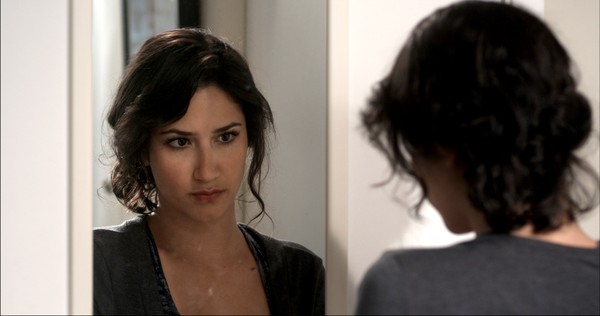
Menon: I hope the film has broad appeal. When we talk about our target audience I think we see it as young women of color, perhaps Persian-American or Indian-American, who can see themselves in these girls, in a way they perhaps haven’t had the chance to before. I never really got that before and that was part of the reason I wanted to make the movie and wanted to create roles for these young women. And if that has a broader appeal, that is great, because it can be broadly accessible and feel like anyone’s story who has felt marginalized. When we talk about target audience, we are only talking about the starting point and looking for way to grow out of that.
Goode: That’s a great way to put it. Certainly, we are not only interested in marketing to women in their 20s. We are throwing a stone into the water and hoping to get some ripple effect. And there is still a misconception, one of many we wanted to challenge with this movie, but one is that while both men and women will watch movies about men, men won’t see movies about women. And I think that is both untrue and unfair to men, and some of the best feedback we’ve gotten has come from men.
TMS: One of the interesting decisions you made, was having the girls drive through the Red States, after they were told don’t bother. What was the inspiration for that part of the story?
Menon: Dramatic conflict? If they just drove up and down the coast of California it might be a fun movie, but not very dramatic or engaging.
Goode: [Laughs] But, also, I’m from Minnesota, and I get really pissed off by the misconception that of “fly-over states.” This idea that no one there knows what’s going on and we’re all ignorant, or that you aren’t important if you aren’t from a costal state. And we show moments of ignorance and racism in some of those areas, because that does happen and we wanted to be truthful. But we also show moments of acceptance from people in those towns. There is the scene with Farah on the porch with the older gentleman, having a friendly conversation about politics. And yeah, they disagree and they know neither will change the other’s mind, but that doesn’t prevent them from having a friendly conversation. We should all aspire to that, and that is sometimes the relationship I have with my family, being this weirdo artsy person they somehow produced, and yet, we still love each other and can have conversations about things we disagree about. So that was a priority to me.
Menon: And it is also about the age of our young women. They were explicitly told by the campaign trainer to focus on swing states and these girls felt they had the ability to turn over hard red states and hardline conservatives who were never going to change their ways. So that youthful nativity energy to think if you just have five minutes to talk to me, I can change your mind, was something we wanted to capture, and watch them grow out of that. So it was important that they be told to not to do something and do it anyway.
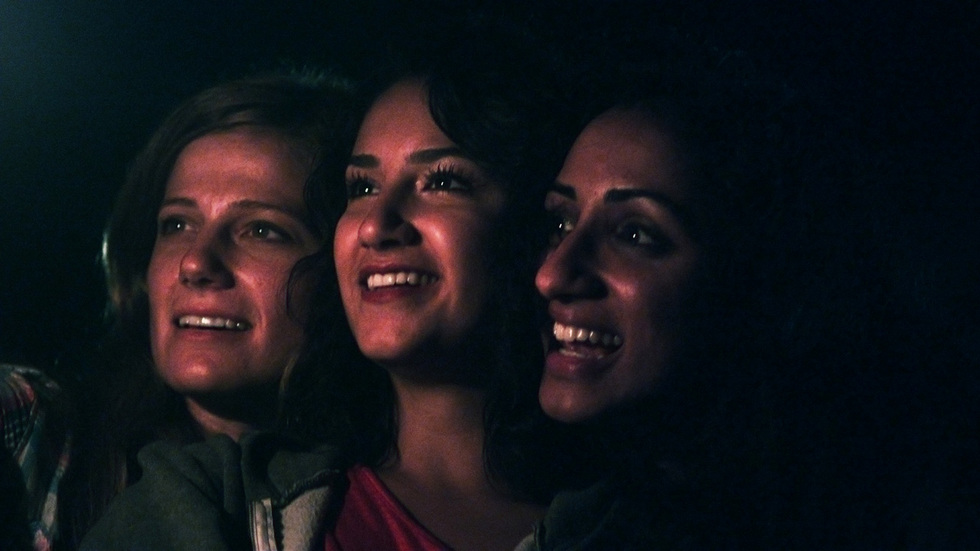
Goode: You can kinda think of growing up like a bell curve, and the peak of being sure of yourself comes around the age of 20 or 22. Before that you are young enough to know, you have a lot more to learn, and after that you realize how much you have left for you to learn. These girls are kind of at their peak arrogance, which is an interesting place for a character to start.
TMS: The same basic story could be told as a drama. Why was it important to infuse these ideas and this story with comedy?
Menon: I don’t think we ever even considered not making it a comedy.
Goode: Also, women’s sexuality is so embattled. It’s so easy for a girl to be slut shamed or for people to see virginity as a prize for women, which it isn’t for men. And especially for a Middle Eastern American female, which is an important issue, so it was important to have it be a comedy to provide some levity. But I also think there is something radical in treating and issue that used to dramatically affect the course of a girl’s life at daring to laugh. It lowers the stakes on virginity which is important for sexual liberation.
Farah Goes Bang is available now on iTunes.
Lesley Coffin is a New York transplant from the midwest. She is the New York-based writer/podcast editor for Filmoria and film contributor at The Interrobang. When not doing that, she’s writing books on classic Hollywood, including Lew Ayres: Hollywood’s Conscientious Objector and her new book Hitchcock’s Stars: Alfred Hitchcock and the Hollywood Studio System.
Are you following The Mary Sue on Twitter, Facebook, Tumblr, Pinterest, & Google +?



